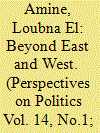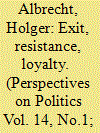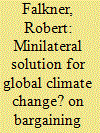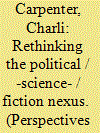|
|
|
Sort Order |
|
|
|
Items / Page
|
|
|
|
|
|
|
| Srl | Item |
| 1 |
ID:
145080


|
|
|
|
|
| Summary/Abstract |
While critiquing the dominance of the Western tradition in the discipline of political theory, recent methodological discussions in Comparative Political Theory (CPT) fail to move beyond the East-West dichotomy. More specifically, CPT does not offer the resources to deal with global convergence as embodied in the phenomenon of modernity. I focus on the emergence of the sovereign state in the modern period and argue that the universal acceptance of the state form creates a globally-shared institutional condition. This condition, in turn, necessitates a shared normative and conceptual apparatus centered on ideals like constitutionalism, rights, and democracy. Two implications follow from my argument. First, we should reconceptualize the history of political thought such that we move from an East/West division to a modern/pre-modern division. Second, alternatives to the dominant (“Western”) model are not real alternatives unless they transcend the sovereign state itself, charting a new course of multilayered local, regional, and global political arrangements.
|
|
|
|
|
|
|
|
|
|
|
|
|
|
|
|
| 2 |
ID:
145076


|
|
|
|
|
| Summary/Abstract |
A few years into the most recent wave of popular uprisings—the Arab Spring—studying regime trajectories in countries such as Syria, Egypt, and Yemen still seems like shooting at a moving target. Yet what has not escaped notice is the central role military actors have played during these uprisings. We describe how soldiers have three options when ordered to suppress mass unrest. They may exit the regime by remaining in the barracks or going into exile, resist by fighting for the challenger or initiating a coup d’état, or remain loyal and use force to defend the regime. We argue that existing accounts of civil-military relations are ill equipped to explain the diverse patterns in exit, resistance, and loyalty during unrest because they often ignore the effects of military hierarchy. Disaggregating the military and parsing the interests and constraints of different agents in that apparatus is crucial for explaining military cohesion during such crises. Drawing on extensive fieldwork we apply our principal-agent framework to explain varying degrees and types of military cohesion in three Arab Spring cases: Bahrain, Yemen, and Syria. Studying military hierarchy elucidates decision-making within authoritarian regimes amid mass mobilization and allows us to better explain regime re-stabilization, civil war onset, or swift regime change in the wake of domestic unrest.
|
|
|
|
|
|
|
|
|
|
|
|
|
|
|
|
| 3 |
ID:
145078


|
|
|
|
|
| Summary/Abstract |
The legalization of world politics is often celebrated for reducing impunity for those who contribute to humanitarian crises. This may sometimes be true but the opposite is also true. In 2010, United Nations peacekeepers unwittingly brought cholera to Haiti and sparked an epidemic. Nearly a million people were made sick and 8,500 died. Legal activists have sought to hold the UN responsible for the harms it caused and win compensation for the cholera victims. However, these efforts have been stymied by the structures of public international law—particularly UN immunity—which effectively insulate the organization from accountability. In short, the UN is empowered, and the cholera victims disempowered, by legalization. The Haiti case powerfully illustrates the dangers of legalism, which have been largely overlooked in discussions of international law, and suggests that law alone is an inadequate arbiter of responsibility in international politics.
|
|
|
|
|
|
|
|
|
|
|
|
|
|
|
|
| 4 |
ID:
145079


|
|
|
|
|
| Summary/Abstract |
Gridlock in the multilateral climate negotiations has created growing scholarly and practical interest in the use of minilateral forums. A large variety of climate club proposals have been developed in recent years, which promise more effective bargaining among the main climate powers, better incentives to encourage mitigation efforts and discourage free-riding, and new ways to align international power asymmetries with the interests of the global climate regime. I investigate the three dominant rationales that underpin minilateralist proposals. I offer a critical review of their potential as well as their limitations in promoting global climate action. I argue that minilateralism is unlikely to overcome the structural barriers to a comprehensive and ambitious international climate agreement. However, climate clubs can enhance political dialogue in the context of multilateral negotiations and can provide a more conducive environment for great power bargaining. They can create club benefits that strengthen mitigation strategies and help reduce the dangers of free-riding for so-called coalitions of the willing. And they can help re-legitimate the global climate regime against the background of profound power shifts that have slowed down progress in the multilateral negotiations.
|
|
|
|
|
|
|
|
|
|
|
|
|
|
|
|
| 5 |
ID:
145075


|
|
|
|
|
| Summary/Abstract |
Scholarship on Syria has traditionally been limited by researchers' difficulty in accessing the reflections of ordinary citizens due to their reluctance to speak about politics. The 2011 revolt opened exciting opportunities by producing an outpouring of new forms of self-expression, as well as encouraging millions to tell their stories for the first time. I explore what we can learn from greater attention to such data, based on thick descriptive analysis of original interviews with 200 Syrian refugees. I find that individuals' narratives coalesce into a collective narrative emphasizing shifts in political fear. Before the uprising, fear was a pillar of the state's coercive authority. Popular demonstrations generated a new experience of fear as a personal barrier to be surmounted. As rebellion militarized into war, fear became a semi-normalized way of life. Finally, protracted violence has produced nebulous fears of an uncertain future. Study of these testimonials aids understanding of Syria and other cases of destabilized authoritarianism by elucidating lived experiences obscured during a repressive past, providing a fresh window into the construction and evolution of national identity, and demonstrating how the act of narration is an exercise in meaning making within a revolution and itself a revolutionary practice.
|
|
|
|
|
|
|
|
|
|
|
|
|
|
|
|
| 6 |
ID:
145077


|
|
|
|
|
| Summary/Abstract |
A burgeoning literature in IR asserts there is a relationship between pop cultural artifacts and global policy processes, but this relationship is rarely explored using observational data. To fill this gap, I provide an evidence-based exploration of the relationship between science-fiction narratives and global public policy in an important emerging political arena: norm-building efforts around the prohibition of fully autonomous weapons. Drawing on in-depth interviews with advocacy elites, and participant-observation at key campaign events, I explore and expand on constitutive theories about the impact of science fiction on “real-world” politics.
|
|
|
|
|
|
|
|
|
|
|
|
|
|
|
|
|
|
|
|
|